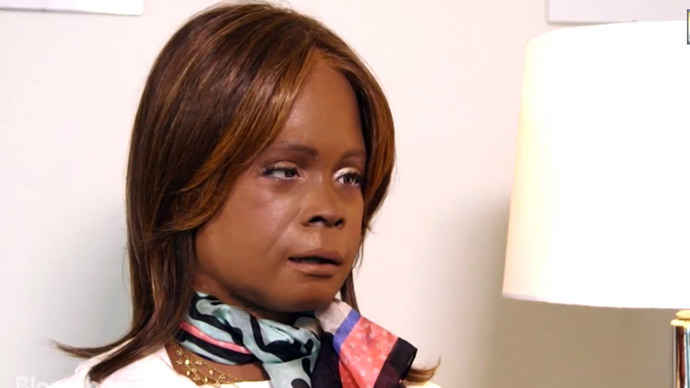Living forever as robot? Prototype lets humans upload their mind into mechanized ‘heads’

An Artificial Intelligence pioneer is embracing the controversial idea of uploading the memories, thoughts and feelings of a living person into a computer to create a Mind Clone or “second self.” The prototype for this new self is called ‘Bina-48’.
Entrepreneur Martine Rothblatt has created a new robotic head that she hopes, one day in the future, humans will be able to upload their minds into. Bina-48 is named after Rothblatt’s real-life wife, Bina Aspen, and serves as a proof-of-concept for the futuristic idea. The robot version is designed to carry on a conversation, with scientists hoping that these mind clones could give human owners a sort of artificial afterlife.
“I believe Mind Clones will be humanity’s biggest invention. The market opportunity is limitless,” Rothblatt told Bloomberg News. “Ultimately – just like we all want a smart phone, we all want a social media account – we are all going to want a Mind Clone. It will make everything in our life more useful, more valuable. It will give us twice as much time to do everything.”
Bena-48 was created five years ago as a digital replica uploaded with Bina Aspen’s thoughts, memories and feelings – all of which were broken down into computer code to create a digital version of her consciousness. Created by Hanson Robotics, Bina-48 can engage in conversation, answer questions and even have “spontaneous” thoughts that are derived from multimedia data in a “mindfile” created by the real Bina.
A similar mindfile is created when a person interacts on Twitter or Facebook and shares photos or blogs regularly – in essence, it’s a digital database of thoughts, memories, feelings and opinions. Mindware mimics the way the human brain supposedly organizes information, creates emotions and achieves self-awareness.
READ MORE: Bill Gates on AI doomsday: ‘I don’t understand why we aren’t concerned’
The proliferation of robots like Bina-48 may seem farfetched now, but Rothblatt is the woman who helped pioneered satellite radio as founder of Sirius and now oversees biotech innovation at United Therapeutics.
“Mind Clone is a digital copy of your mind outside of your body,” said Rothblatt. “I think Mind Clone will look like an avatar on the screen, talking, instead of a robot version. Mind Clones are 10-20 years away.”
“Am I talking about a law of physics here? Am I talking about defying gravity here? No. Am I talking about going faster than light? No. All I am doing here is talking about writing some good code.”
READ MORE:Elon Musk donates $10mn to stop AI from turning against humans
Companies such as eterni.me, Gordon Bell’s MyLifeBits, and Terasem’s Lifenaut are all pursuing Mind Clone to help a person’s personality, work and relationships survive after death.
Eterni.me is a proposed for-profit service that will reportedly offer immortality by creating “a virtual YOU, an avatar that emulates your personality and can interact with, and offer information and advice to your family and friends, even after you pass away.”












